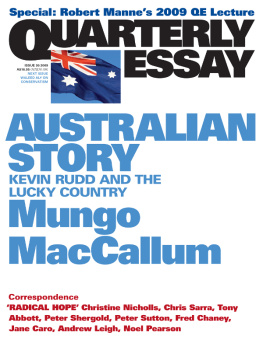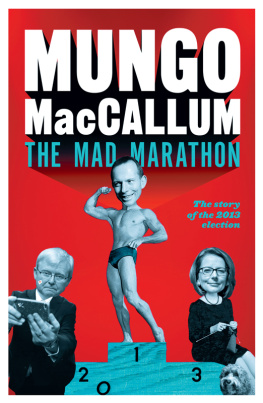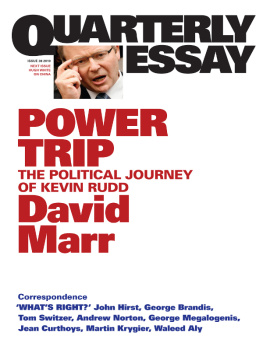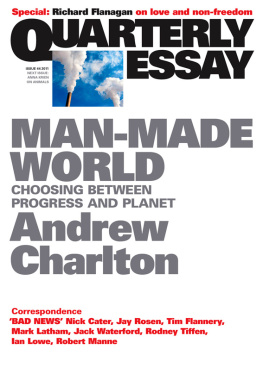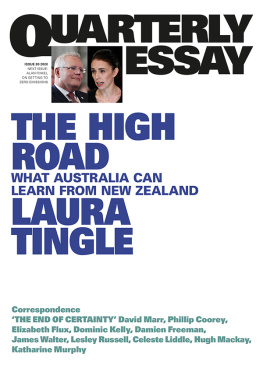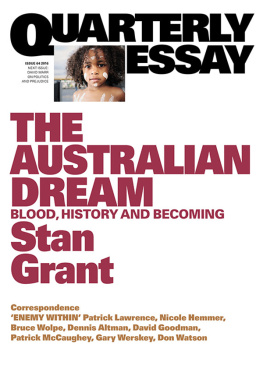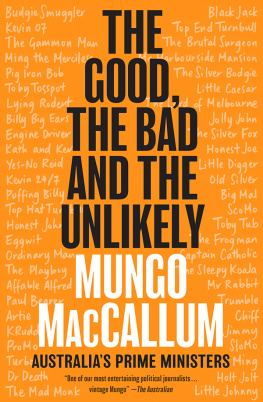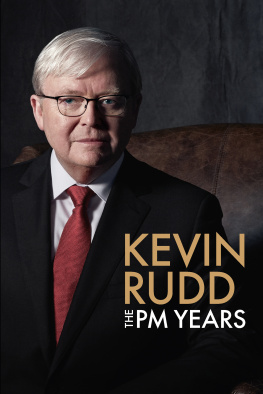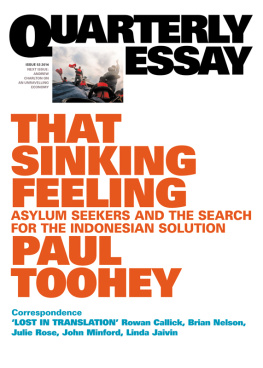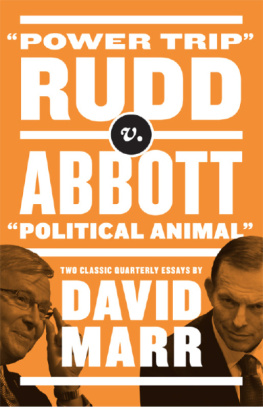Mungo MacCallum - Quarterly Essay 36 Australian Story: Kevin Rudd and the Lucky Country
Here you can read online Mungo MacCallum - Quarterly Essay 36 Australian Story: Kevin Rudd and the Lucky Country full text of the book (entire story) in english for free. Download pdf and epub, get meaning, cover and reviews about this ebook. year: 2009, publisher: ReadHowYouWant, genre: Politics. Description of the work, (preface) as well as reviews are available. Best literature library LitArk.com created for fans of good reading and offers a wide selection of genres:
Romance novel
Science fiction
Adventure
Detective
Science
History
Home and family
Prose
Art
Politics
Computer
Non-fiction
Religion
Business
Children
Humor
Choose a favorite category and find really read worthwhile books. Enjoy immersion in the world of imagination, feel the emotions of the characters or learn something new for yourself, make an fascinating discovery.
- Book:Quarterly Essay 36 Australian Story: Kevin Rudd and the Lucky Country
- Author:
- Publisher:ReadHowYouWant
- Genre:
- Year:2009
- Rating:5 / 5
- Favourites:Add to favourites
- Your mark:
- 100
- 1
- 2
- 3
- 4
- 5
Quarterly Essay 36 Australian Story: Kevin Rudd and the Lucky Country: summary, description and annotation
We offer to read an annotation, description, summary or preface (depends on what the author of the book "Quarterly Essay 36 Australian Story: Kevin Rudd and the Lucky Country" wrote himself). If you haven't found the necessary information about the book — write in the comments, we will try to find it.
Quarterly Essay 36 Australian Story: Kevin Rudd and the Lucky Country — read online for free the complete book (whole text) full work
Below is the text of the book, divided by pages. System saving the place of the last page read, allows you to conveniently read the book "Quarterly Essay 36 Australian Story: Kevin Rudd and the Lucky Country" online for free, without having to search again every time where you left off. Put a bookmark, and you can go to the page where you finished reading at any time.
Font size:
Interval:
Bookmark:
Black Inc., an imprint of Schwartz Media Pty Ltd.
Publisher: Morry Schwartz.
No part of this publication may be reproduced,
stored in a retrieval system, or transmitted in
any form by any means electronic, mechanical,
photocopying, recording or otherwise without
the prior consent of the publishers.
Australia incl. GST. Outside Australia $79.
2 years (8 issues): $95 within Australia incl. GST.
Outside Australia $155.
Payment may be made by Mastercard or Visa, or
by cheque made out to Schwartz Media. Payment
includes postage and handling.
card, or subscribe online at:
addressed to the Editor at:
Melbourne VIC 3000 Australia
Phone: 61 3 9654 2000 / Fax: 61 3 9654 2290
Email:
subscribe@blackincbooks.com (subscriptions)
Caitlin Yates. Publicity: Elisabeth Young. Design:
Guy Mirabella. Production Co-ordinator: Adam
Shaw
Group. The text pages of this essay are printed
on ENVI Carbon Neutral paper.
Kevin Rudd and the Lucky Country
2009 Quarterly Essay Lecture
Fred Chaney, Jane Caro, Andrew Leigh, Noel Pearson
STORY
Lucky Country
Font size:
Interval:
Bookmark:
Similar books «Quarterly Essay 36 Australian Story: Kevin Rudd and the Lucky Country»
Look at similar books to Quarterly Essay 36 Australian Story: Kevin Rudd and the Lucky Country. We have selected literature similar in name and meaning in the hope of providing readers with more options to find new, interesting, not yet read works.
Discussion, reviews of the book Quarterly Essay 36 Australian Story: Kevin Rudd and the Lucky Country and just readers' own opinions. Leave your comments, write what you think about the work, its meaning or the main characters. Specify what exactly you liked and what you didn't like, and why you think so.

